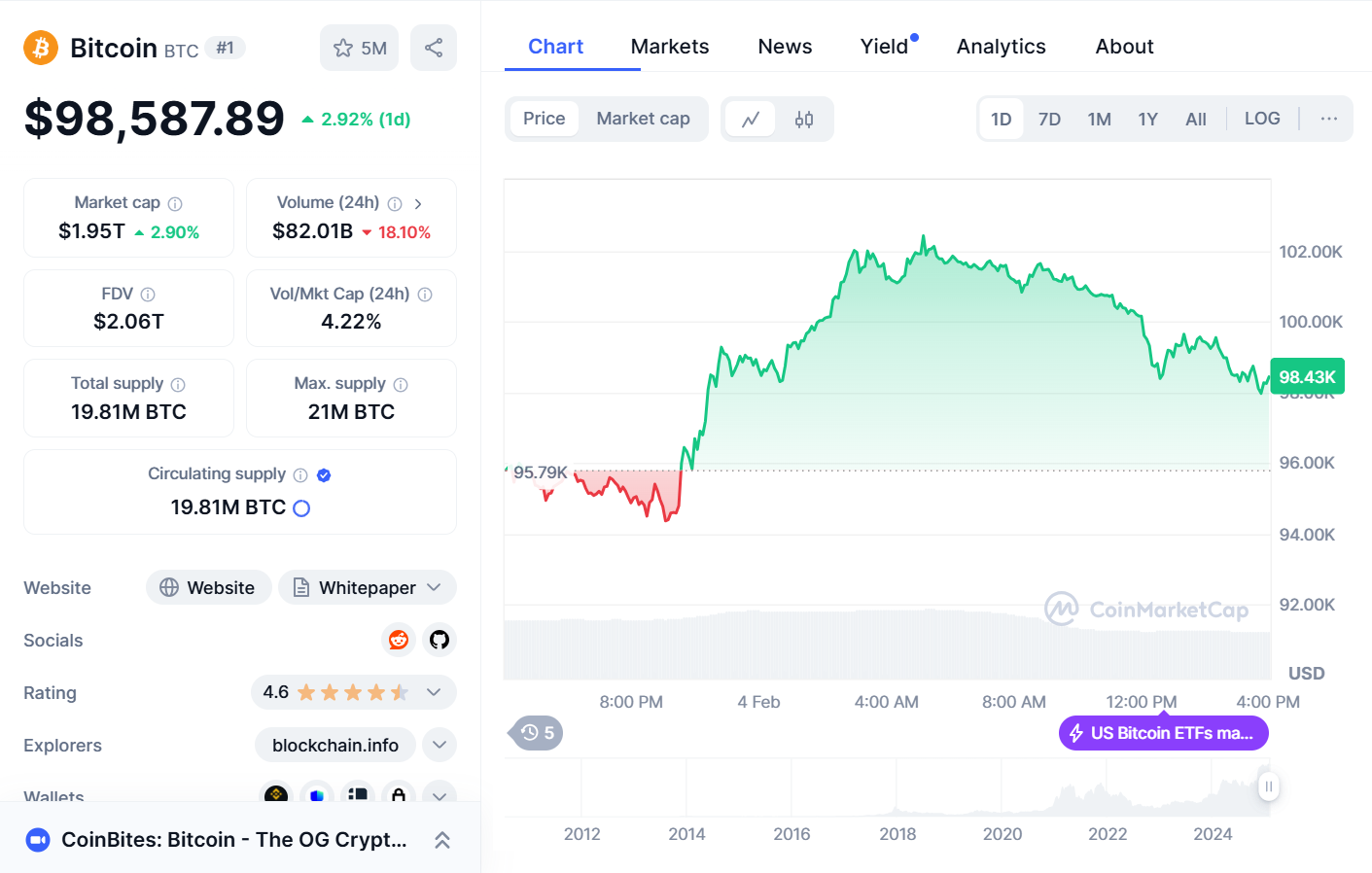Bitcoin is currently struggling to maintain a position above $100,000 after hitting a level of $99,300 on February 4, 2025. This comes on the heels of a major development in international trade tensions, as China has announced retaliatory tariffs on a range of U.S. goods. The tariffs, scheduled to take effect on February 10, 2025, will include a 15% tariff on coal and liquefied natural gas, and a 10% tariff on crude oil, agricultural machinery, and certain vehicles.
China’s Tariff Announcement Adds Pressure on Global Markets
This decision by China is in direct retaliation for the additional tariffs imposed by the U.S. on Chinese imports earlier this year. According to a translated statement from China’s Ministry of Finance, the U.S.’s unilateral tariff imposition violates World Trade Organization (WTO) regulations, prompting China to take action in defense of its national interests. The announcement has set off alarm bells in global markets, with Bitcoin and other risk assets facing pressure from the uncertainty caused by the trade dispute.
China’s Ministry of Commerce also revealed plans to tighten export controls on key materials such as tungsten, tellurium, bismuth, molybdenum, and indium. These are critical elements in various high-tech industries, and China’s decision to limit their export is seen as a safeguard for the country’s national security and economic interests. The combination of these moves signifies an intensifying trade standoff between the U.S. and China, which is contributing to a climate of volatility in financial markets, including cryptocurrencies.
The US imposed 10% tariffs on Chinese goods, prompting China to retaliate with 10-15% tariffs on American oil, agricultural machinery, coal, and LNG.
The trade war with Mexico has already caused market declines, and #BTC is now trading below $100,000 again. pic.twitter.com/ws66ky62dh— TierUP Daily (@Tier_Up_Crypto) February 4, 2025
Bitcoin’s Recent Price Movements: A Roller Coaster Ride
Bitcoin’s price has shown notable fluctuations in recent days. As of today, the cryptocurrency is hovering around $99,300, dipping briefly to $98,500 before recovering. This recent dip came after Bitcoin had made a strong recovery on Monday, surging back above the $100,000 threshold following U.S. President Donald Trump’s announcement that tariff threats with Mexico would be paused for a month.
However, as of now, the sharp recovery appears to have been short-lived, as geopolitical tensions weigh on Bitcoin’s price. The cryptocurrency, once seen primarily as a digital alternative to gold, continues to be perceived as a risk asset by many investors. Therefore, the new tariffs imposed by China are likely to put additional pressure on the broader crypto market, as investors might flock to safer assets, which typically leads to sell-offs in volatile markets.

The Immediate Market Response: Overreaction or Anticipated Decline?
The initial reaction of the market to the tariff announcement has been one of heightened volatility. Bitcoin prices dipped in response to the announcement, as fear and uncertainty took hold. Min Jung, a research analyst at Presto Research, commented on the situation, stating that the market’s first reaction to China’s tariff decision might have been an overreaction. As seen in the recent V-shaped recovery, Bitcoin quickly rebounded before the announcement.
Jung speculated that the longer-term impact of these tariffs on Bitcoin and other risk assets will depend on whether this marks the beginning of a broader trade escalation or remains a singular event. She cautioned that volatility in the market is likely to remain high as headlines related to tariffs continue to shape investor sentiment.
The Potential Impact of a Prolonged Trade War
While China’s retaliation is significant, experts believe that the real escalation in the trade war is yet to come, particularly with the potential involvement of Europe. Justin d’Anethan, head of sales at Liquifi, remarked that the tension between the U.S. and China could significantly impact the cryptocurrency market if the trade war intensifies. In particular, a prolonged and escalating trade conflict could further erode confidence in digital assets like Bitcoin, which are seen as speculative investments.
Moreover, Nick Ruck, director of LVRG Research, warned that an escalating trade war could push crypto assets into a deeper sell-off unless the U.S. can negotiate a cancellation or postponement of tariffs, as was done with Canada and Mexico. The continued geopolitical tensions could weigh heavily on investor sentiment and potentially diminish Bitcoin’s upward momentum in the near term.
With the global landscape increasingly shaped by trade wars and political uncertainties, Bitcoin’s role as a store of value or speculative asset continues to be tested. As China’s retaliatory tariffs on the U.S. are set to go into effect, Bitcoin’s price will likely continue to reflect the broader market sentiment influenced by these geopolitical events. Investors should stay informed and prepared for continued volatility as this international standoff unfolds.
Related news: Ethereum, Solana Surge 18% as Trump Extends Tariff Pause to Canada








